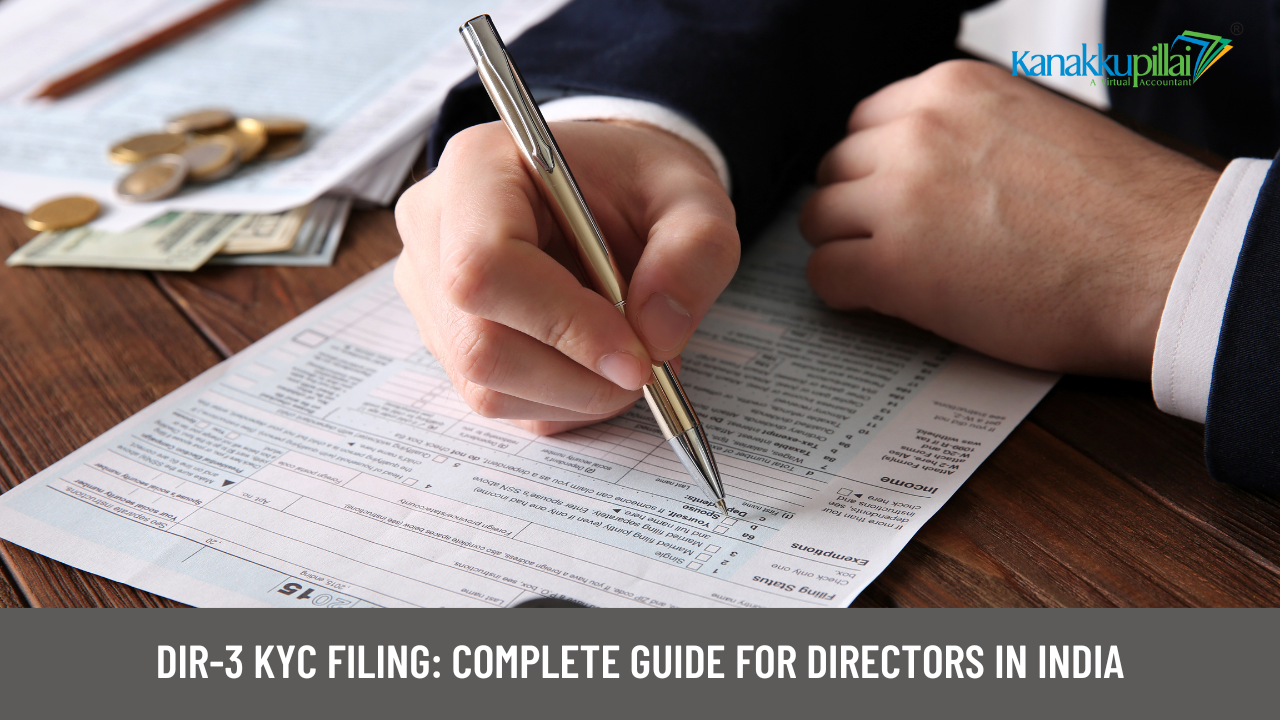DIR-3 KYC Filing: Complete Guide for Directors in India

Every individual holding a Director Identification Number (DIN) in India must comply with the DIR-3 KYC filing requirement introduced by the Ministry of Corporate Affairs (MCA). This mandatory process ensures that the government maintains updated and accurate records of directors associated with Indian companies.
Failing to file DIR-3 KYC on time can lead to penalties, DIN deactivation, and other legal consequences. This guide explains everything you need to know about DIR-3 KYC filing, including its importance, due dates, required documents, and step-by-step filing procedures.
What is DIR-3 KYC?
DIR-3 KYC is an annual compliance requirement for all directors with an active DIN. The MCA introduced this rule to verify and update director details such as name, address, contact information, and PAN.
The filing must be done every financial year, and non-compliance can result in a DIN being marked as “Deactivated.” Once deactivated, the director cannot use the DIN for any company-related filings until the KYC is completed with additional late fees.
Who Needs to File DIR-3 KYC?
The following individuals must submit DIR-3 KYC:
- All DIN holders (active or inactive) – Even if a director is not currently associated with any company, they must file DIR-3 KYC if their DIN was allotted before the financial year.
- Foreign nationals holding DIN – Foreign directors must also comply with this requirement.
- Proposed directors – Individuals who have been allotted a DIN but not yet appointed as directors in any company must still file DIR-3 KYC.
Due Date for DIR-3 KYC Filing
The deadline for DIR-3 KYC filing is September 30th of each financial year. For example, for FY 2023-24, the last date was September 30, 2024.
If a director misses the deadline, the MCA allows a late filing with an additional fee. However, if the filing is not completed even after the late period, the DIN may be deactivated.
Documents Required for DIR-3 KYC Filing
To complete the DIR-3 KYC process, directors must submit the following documents:
- PAN Card – Mandatory for Indian nationals. Foreign nationals must provide a passport copy.
- Aadhaar Card – Required for OTP-based verification (if applicable).
- Passport (Foreign Nationals Only) – Must be notarized or apostilled if outside India.
- Address Proof – Valid documents include:
- Voter ID
- Driving License
- Electricity Bill (not older than 2 months)
- Bank Statement
- Mobile Number & Email ID – Must be linked for OTP verification.
- Digital Signature Certificate (DSC) – The director must have a registered DSC for e-filing.
Step-by-Step Process for DIR-3 KYC Filing
Step 1: Access the MCA Portal
- Visit the MCA website (www.mca.gov.in) and log in using your credentials.
Step 2: Select DIR-3 KYC Form
- Go to the “MCA Services” section and select “DIR-3 KYC.”
Step 3: Fill in the Required Details
- Enter personal details such as:
- DIN
- Full Name (as per PAN)
- Father’s Name
- Date of Birth
- Residential Address
- Contact Details (Mobile & Email)
- PAN (for Indian nationals) / Passport (for foreign nationals)
Step 4: Upload Supporting Documents
- Attach scanned copies of:
- PAN Card
- Address Proof
- Passport (for foreign nationals)
Step 5: Digital Signature (DSC) Verification
- The form must be digitally signed by the director using a registered DSC.
Step 6: Submit and Pay Fees
- After verification, submit the form and pay the applicable fee (₹100 for on-time filing, higher for late submissions).
Step 7: Confirmation & Acknowledgment
- Once submitted, an SRN (Service Request Number) is generated. Track the status using this number.
- Upon approval, the director receives a confirmation email.
Consequences of Not Filing DIR-3 KYC
- DIN Deactivation – Non-filing leads to DIN being marked as “Deactivated,” restricting the director from signing any company documents.
- Late Fees – Late submissions attract additional penalties (₹5,000 for delayed filings).
- Legal Non-Compliance – Companies may face scrutiny for having directors with inactive DINs.
How to Reactivate a Deactivated DIN?
If a DIN is deactivated due to non-filing, the director must:
- File DIR-3 KYC with a late fee of ₹5,000.
- Submit a request to the MCA for reactivation.
- Once approved, the DIN becomes active again.
Frequently Asked Questions (FAQs)
1. Is DIR-3 KYC mandatory for all directors?
Yes, every individual holding a DIN must file DIR-3 KYC annually.
2. What happens if I miss the filing deadline?
Late filing is allowed with a penalty of ₹5,000. If not filed even after the extended period, the DIN gets deactivated.
3. Can a company file DIR-3 KYC on behalf of directors?
No, each director must file their own DIR-3 KYC using their DSC.
4. Is Aadhaar mandatory for DIR-3 KYC?
Aadhaar is required for OTP verification but not mandatory if the director uses DSC for authentication.
5. What if my details have not changed since last year?
Even if details remain the same, directors must reconfirm and submit DIR-3 KYC annually.
Conclusion
DIR-3 KYC is a crucial compliance requirement for all directors in India. Timely filing ensures that DINs remain active, avoiding penalties and legal issues. By following the step-by-step process and submitting the correct documents, directors can easily comply with this regulation.
If you have any doubts or need assistance with DIR-3 KYC filing, consult a professional or visit the MCA portal for updates. Stay compliant and keep your DIN active!



